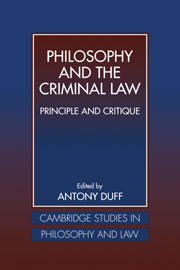Book contents
- Frontmatter
- Contents
- List of Contributors
- Introduction
- 1 Contingency, Coherence, and Conceptualism: Reflections on the Encounter between ‘Critique’ and ‘the Philosophy of the Criminal Law’
- 2 Does Criminal Liability Require an Act?
- 3 ‘Simulacra of Morality’? Beyond the Ideal/Actual Antinomies of Criminal Justice
- 4 Principle and Contradiction in the Criminal Law: Motives and Criminal Liability
- 5 On the General Part of the Criminal Law
- Index
3 - ‘Simulacra of Morality’? Beyond the Ideal/Actual Antinomies of Criminal Justice
Published online by Cambridge University Press: 17 September 2009
- Frontmatter
- Contents
- List of Contributors
- Introduction
- 1 Contingency, Coherence, and Conceptualism: Reflections on the Encounter between ‘Critique’ and ‘the Philosophy of the Criminal Law’
- 2 Does Criminal Liability Require an Act?
- 3 ‘Simulacra of Morality’? Beyond the Ideal/Actual Antinomies of Criminal Justice
- 4 Principle and Contradiction in the Criminal Law: Motives and Criminal Liability
- 5 On the General Part of the Criminal Law
- Index
Summary
To grasp totality is to break with our ordinary notions of identity. … It is to see things existentially constituted, and permeated, by their relations with others; and to see our ordinary notion of identity as an abstraction not only from [its] existentially constitutive processes of formation (geohistories), but also from [its] existentially constitutive inter-activity (internal relatedness). … When is a thing no longer a thing but something else? … [I]n the domain of totality we need to conceptualise entity relationism.
(Bhaskar 1993: 125)In recent years, Anglo-American jurisprudence has been marked by debates between those in the liberal tradition and those who take more critical and sceptical positions. These debates have sometimes been marked by acrimony. Recently, Michael Moore described ‘those of a sceptical cast of mind’ as ‘gadflies’ and as the ‘stray dogs of the intellectual world’ (Moore 1993a: 130). He felt able to ‘put aside’ one sceptical critique without consideration or formal citation. For sceptics, it is perhaps some consolation to keep Moore ‘honest’ (1993a: 130), but I hope to show not only that scepticism is defensible in itself but also that it is a means to a greater good.
- Type
- Chapter
- Information
- Philosophy and the Criminal LawPrinciple and Critique, pp. 101 - 155Publisher: Cambridge University PressPrint publication year: 1998
- 17
- Cited by

